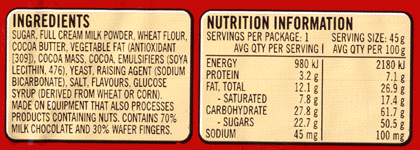5/2/2016
 According to an US economist introducing food labels for highly processed foods could mean that obesity levels would drop.
According to an US economist introducing food labels for highly processed foods could mean that obesity levels would drop.
The situation with obesity levels in Australia is now considered to be a epidemic levels with over 63% of all adults either overweight or obese. Currently around 25% of all children are obese or overweight.
Economist Dr Trent Smith, from the University of Otago, is currently in Canberra for the Annual Conference of the Australian Agricultural and Resource Economics Society. He has studied the history of food labeling and how people make food choices.
He said it should be the responsibility of governments to make sure companies label their food clearly, so consumers can make simple choices.
Dr Smith said the following:
“Trans fats are a very good example of a success story,”
Trans fats were introduced to the food supply in 1913, by the American company Crisco.
They marketed their vegetable shortening product as a more digestible, hygienic option than animal fats. By the early 1990s, the science was pretty solid that these trans fats were causing heart disease and killing people by the tens of thousands,” That then set up a political battle. The food industry did not want to change, they said ‘no it’ll be too costly, we can’t reformulate [our products]’.
It was not until 2006 that the US introduced mandatory trans fat labelling on products. What happened then was amazing,
Trans fats weren’t banned, but just the fact that this food label was coming out and that it was going to be mandatory meant that the food processors would have to say so on a label. That provided consumers with a very simple rule of thumb: just avoid the product that has anything but 0 on that trans fat label.”
Currently in Australia it is not mandatory for food companies to include trans fats of labels. It is the same for high fructose corn syrup which has been show to be a significant contributor to the consumption of energy which in turn fuels the obesity epidemic.
Australian labels do provide a significant amount of information in relation to sugars and energy content however this is not deterring the consumption of these foods.
But Dr Smith said the following:
“History shows that including just one word — “imitation” — on processed foods can drastically change consumer behaviour.
In 1938, the US congress passed a law that made it mandatory to include “imitation” on highly processed foods.
How the imitation label worked was that if you wanted to sell spaghetti sauce that was produced in a way that was substantially different than how people produced it in their own kitchens, you had to put the word ‘imitation’ on the label.
“You had to call it ‘imitation spaghetti sauce’,
This had a powerful effect on the market, on consumers.
Nobody wanted to buy ‘imitation’ anything.
The producers realised consumers would not buy their products if they were too processed, so ensured they processed foods below the “imitation” level.
While this policy worked for almost 40 years, the US Food and Drug Administration eliminated the law in 1973.
It was at the behest of the food industry,
Interestingly, this was just before the obesity epidemic started.”
To view how the ABC reported this story click this link.





